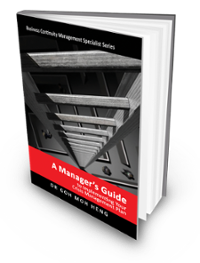CM Framework
The “Framework” is a broad overview or outline of interlinked items that support the CM approach in meeting an organisation's specific objective.
Integrated Crisis Management
For any crisis management framework to be practical, there is a requirement to have the crucial component of crisis management identified and integrated.
Mitroff and Pearson (1993) pointed out that most crisis procedures are ineffective because they fail to explicitly and systematically explain how to respond to the four CM components.

Key Components for Crisis Management
Components of CM
The four CM components are categorised into types, stages, systems, and interested parties.
Types
“Types” refer to the scope of the CM plan. It answers the following questions:
- What crisis should the organization prepare for?
- What kinds of crises can be neglected safely?
- What is the criterion or rationale for deciding which crises to prepare for or neglect?
Stages and Phases
The “Stages” and “Phases” address each crisis phase's activities and management issues. The three stages of crisis are:
- Pre-crisis
- During Crisis
- Post Crisis
In contrast to the business continuity management planning, the “Phases” refers to the six “Rs”. It corresponds to the activity sequence before, during and after an incident. They are:
- Reduce
- Respond
- Resume
- Recover
- Restore
- Return

Stages of a Crisis.
Systems
The “Systems” examines the causes of the crisis. These sub-variables and their interaction can be identified as having a critical influence on the origin of the crisis. They are categorised as:
- Natural
- Technological
- Confrontation
- Malevolence
- Organizational Misdeeds
- Skewed Management Values
- Deception
- Management Misconduct
- Workplace Violence
- Rumours
- Lack of Funds
Interested Parties (or Stakeholders)
 "Interested parties", sometimes called “Stakeholders", refer to the internal and external parties that may affect or be affected by the organisation’s crisis.
"Interested parties", sometimes called “Stakeholders", refer to the internal and external parties that may affect or be affected by the organisation’s crisis.
An Interested Party is often called any person, group or entity with a genuine and direct interest. It can make decisions that will result in a recognisable stake in the outcome of an organization.

Identify Interested Parties.
Setting the Crisis Management Framework
Developing a crisis management capability needed to be strategically directed from the top of an organization and implemented through a crisis management framework.
One aspect of this is that executive management should establish, define and document policy for crisis management that:
- Outline clearly and concisely their objectives in managing a crisis
- Describe in broad terms how they intend to realize these
- Demonstrate management commitment to high standards in crisis management
Policy
The policy should serve as the basis and business case for further activities related to the planning and implementation of crisis management procedures.
Policy Statement
The policy statement should identify those responsible for its different elements, coordination, and embedding of crisis management as a mainstream activity.
The policy statement should:
- Establish priorities, timelines and standards for delivering key elements of the organization’s crisis management capability and appropriate resources
- Include mechanisms for review
- Ensure that the policy continues to be supported
- Remains consistent with the overall strategic objectives of the organisation
- Monitor progress and evaluate against the agreed deliverables
Roles and Responsibilities
 Roles and responsibilities required to implement all crisis management capabilities should be identified, documented and communicated.
Roles and responsibilities required to implement all crisis management capabilities should be identified, documented and communicated.
People’s knowledge, skills, and experience should be considered. The organization should also consider the resources needed for each capability element and the associated training requirements.
It should also appoint a person(s) with the appropriate authority to be accountable for developing and implementing crisis management capability and its ongoing maintenance and management across the organization.
Enterprise-wide CM Strategy
There should be an enterprise-level strategy. This includes the policy-driven requirement that the crisis management program exists to support or otherwise safeguard every employee in every company worldwide, regardless of political or organizational alignment or the individual's functional role.
Resource
Goh, M. H. (2016). A Manager’s Guide to Implement Your Crisis Management Plan. Business Continuity Management Specialist Series (1st ed., p. 192). Singapore: GMH Pte Ltd.
Extracted from Develop CM Framework
More Information About Crisis Management Blended/Hybrid Learning Course
To learn more about the course and schedule, click the buttons below for the CM-300 Crisis Management Implementer [CM-3] and the CM-5000 Crisis Management Expert Implementer [CM-5].








![[BL-CM] [5] Register](https://no-cache.hubspot.com/cta/default/3893111/82024308-16f4-4491-98be-818a882c6286.png)

![Email to Sales Team [BCM Institute]](https://no-cache.hubspot.com/cta/default/3893111/3c53daeb-2836-4843-b0e0-645baee2ab9e.png)

![[BL-CM-3] What is a CM-300 Blended Learning?](https://no-cache.hubspot.com/cta/default/3893111/4378484c-0831-4bd5-8e68-eefd9717a50e.png)

![[BL-CM-5] What is a CM-5000 Blended Learning Course?](https://no-cache.hubspot.com/cta/default/3893111/ccefd4e5-12da-439f-b4dc-50cec862ebca.png)
![Banner [BL-5-Catalog] What Expert Level Blended Learning Courses that are Available?](https://no-cache.hubspot.com/cta/default/3893111/f39d2d89-53b2-4f11-982f-dd3462f224ac.png)
![[BL-3-Catalog] What Specialist Level Blended Learning Courses that are Available?](https://no-cache.hubspot.com/cta/default/3893111/1073197e-c1bd-47d3-97dc-32e7533619b7.png)

